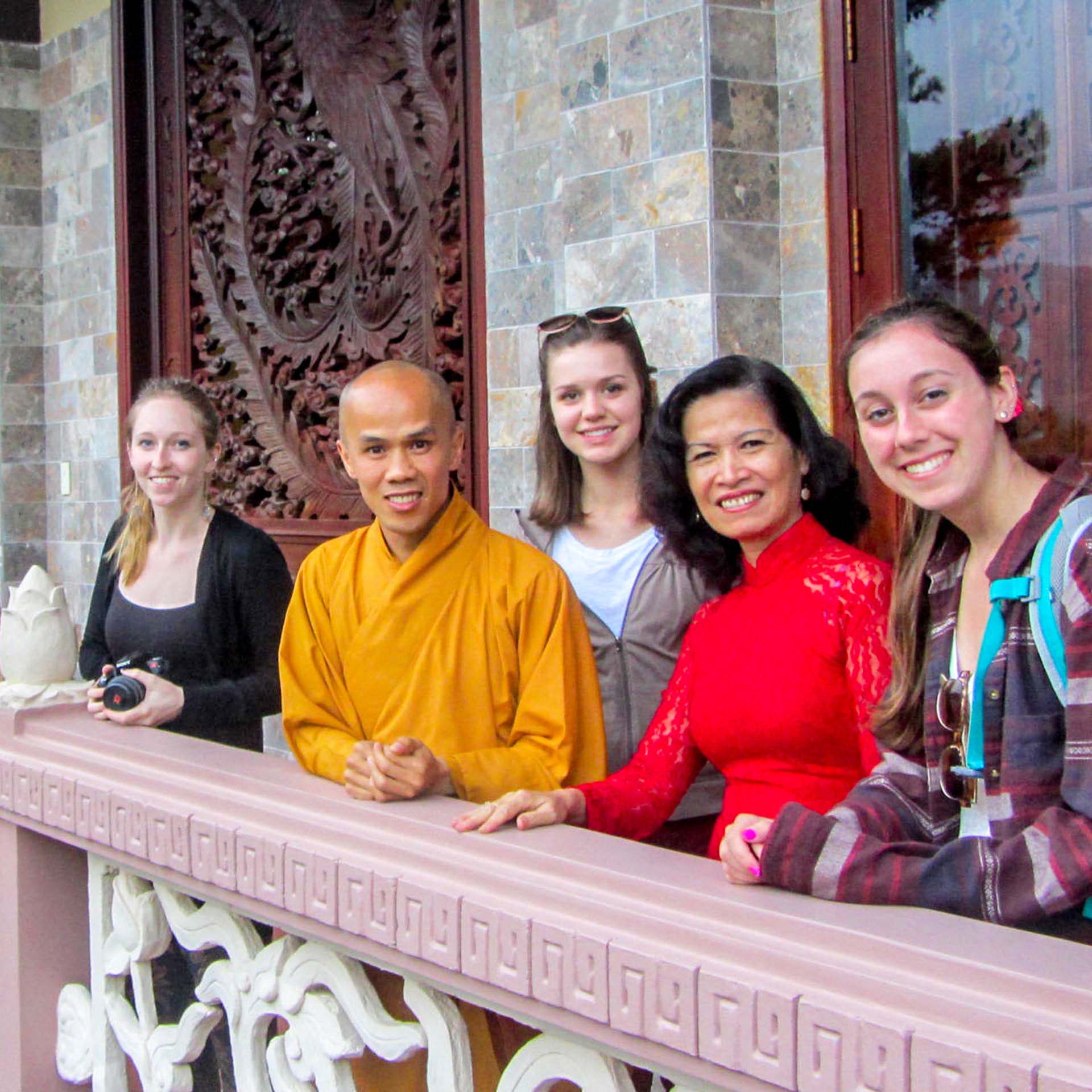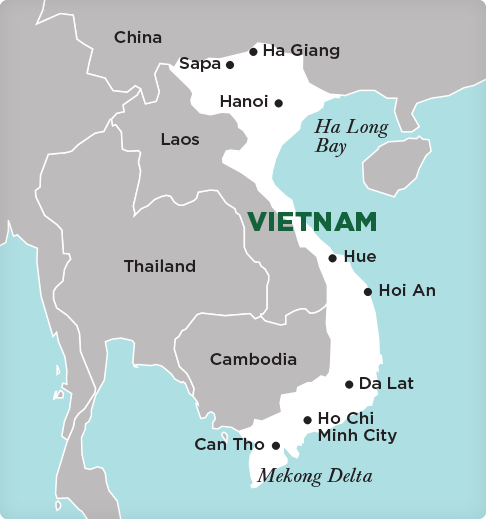Credits
16
Prerequisites
None
Language of Study
Vietnamese, Chinese
Courses taught in
English
Dates
Sep 3 – Dec 16
Program Countries
Vietnam
Program Base
Ho Chi Minh City
Critical Global Issue of Study
Development & Inequality

Examine economic and social change in the cultural context of Vietnam, one of Asia’s most dynamic and rapidly changing countries.
16
None
Vietnamese, Chinese
English
Sep 3 – Dec 16
Vietnam
Ho Chi Minh City
Development & Inequality
Vietnam’s rising status as a nation of extraordinary growth and socioeconomic change is matched only by its ecological and cultural attractions, which include 11 biosphere reserves and eight UNESCO World Heritage sites. Study Vietnam’s rich history, overcoming decades of war and isolation to become one of Asia’s strongest economies through social, political, and economic transformation. Meet government officials, Vietnamese National Assembly members, and well-known professors at the Vietnamese national universities in Ho Chi Minh City and Hanoi Capital University. Local university students will also attend SIT lectures and can help you experience their culture. While all classes are taught in English, students can choose to learn either the Vietnamese language or Chinese language during the semester.
Observe international and local NGOs such as Oxfam and Vietnam Union for Science and Technology Association (VUSTA), an umbrella organization for research and professional associations. Experience Indigenous music, arts, dress, and traditions. Visit the capital city of Hanoi, the cradle of Vietnamese civilization. Explore Hue, Vietnam’s last imperial city and home to the Forbidden Citadel and its tombs. Trek to the Phong Nha cave system and see the oldest karst mountains of Asia, formed 400 million years ago. Experience the unique landscape of Ha Long Bay, where more than 1,600 islands of different sizes are clustered around this UNESCO World Heritage site. Live with a Vietnamese host family in Ho Chi Minh City, the program’s base, and assist in a community-led service project.
None


Get an introduction to Vietnamese history at the History Museum and the oldest zoo in Southeast Asia. Learn from monks at the Van Hanh Institute how Buddhist tradition has been blended with local Vietnamese culture at Jade Emperor Temple. Visit the War Remnant Museum and the Cu Chi tunnels to look at the Vietnam War from multiple perspectives. Take day trips to the Can Gio mangrove forest on the coastline of Ho Chi Minh City. Learn about the rise of civil society through direct encounters with local NGOs which have reemerged after the pandemic. Take field trips to Binh Duong Industrial Zones (VSIP) and Dong Nai province (ONP factory) to get hands-on learning on new strategies and emerging business trends from the Vietnam Economic Development. At Cat Tien national park, you will observe the rich flora and fauna and learn about the park’s conservation efforts. Students from local universities will join you in various learning activities, such as tree planting in the Can Gio mangrove forests, group discussions on readings, and cross-cultural educational exchanges. This presents a variety of opportunities to learn about social change in Vietnam, especially as the country breaks down barriers to foreign investment.
Attend lectures at Can Tho University and Mekong Delta Rice Institute on farming, crop diversification, husbandry, water resources, climate change, and microfinance. Conduct village case studies on various rural development projects together with local students. Learn applications of hi-technology in wet-rice farming, vegetation and husbandry. Observe revived festivals and witness the resurgence of Buddhist popular religion in Vietnam. In the palm forests and green pomelo gardens of Ben Tre province, study vegetation diversification to support sustainability. Discover efforts to protect mangrove forests in Tra Su or Tram Chim National Park, natural habitats for water birds, bats, and rare species.
Home to some of the best mountain biking and hiking in Vietnam, Da Lat’s altitude (1,500–2,000 meters) and fertile landscape also make it one of Vietnam’s main agricultural areas. Explore French architectural legacies untouched by the Vietnam conflict and learn about the culture of the K’ho ethnic groups, who have promoted ethnic and cultural tourism as a development strategy. Learn about poverty reduction in the Central Highlands and how the region has improved market access. On a two-day trip to Bidoup Nui Ba National Park, you will experience rich flora and fauna systems and learn about the park’s conservation efforts. You will discover how local ethnic K’ho people view and relate to their environments and get practical tools to take effective action toward environmental social change. While SIT students will have interactive educational exchanges with local students at Da Lat University on forestry ecosystems, they will also have various opportunities to learn with local students at Nha Trang University, a city next to a famous central beach. The local lectures at both universities will help you understand local environmental issues and explore ways to remain resilient in the face of environmental crises.
This region features UNESCO World Cultural Heritage sites Hoi An, My Son, and Hue. In Hue, Vietnam’s last imperial city, explore the Forbidden Citadel and learn about Hue culture and the last feudal dynasty. In Hoi An, witness efforts to preserve hundreds of old houses and intangible cultural spaces. This visit may include My Son sanctuary, a center of Hinduism for the Cham Kingdom, which dominated central and southern Vietnam from the 4th to the 13th centuries, where you can learn about Cham architecture and music. Da Nang City is Vietnam’s third-largest city and its major hub for commerce, tourism, and education. You may admire the natural wonders in Ba Na Hills, explore jungles in Son Tra Peninsula, and pray at Linh Ung Pagoda with Vietnam’s tallest Bodhisattva Statue at 67 meters.
In the fall semester, an excursion may be arranged to Cu Lao Cham, an island marine park in Hoi An. Learn about plans for sustainable development in the region to preserve the environment while enhancing income opportunities for the residents. Activities at this location may include snorkeling at a nearby coral reef. Also visit Da Nang, the fastest-developing city in central Vietnam.
In the spring semester, travel to UNESCO World Heritage site Phong Nha National Park in Central Vietnam. The remarkable park contains the oldest karst mountains in Asia, formed approximately 400 million years ago. Riddled with hundreds of cave systems — many of extraordinary scale and length — as well as spectacular underground rivers, Phong Nha is a speleologist’s dream.
On the banks of the Red River is 1,000-year-old Hanoi, Vietnam’s capital and the cradle of Vietnamese civilization. Visit Van Mieu Temple, the oldest university in Vietnam, the Presidential Palace, and the Vietnam Museum of Ethnology. Your visit will include the newly excavated 11th-century Imperial City of Thang Long, built when Vietnam gained independence from Chinese occupation. Meet historians and government officials, discuss the preservation of heritage sites, observe international and local NGOs in action, and learn about rural development issues while meeting with communities in beautiful, mountainous Sapa, a town northwest of Hanoi. Before the ISP period, students will visit Ha Long Bay, the UNESCO World Heritage site where cruises sail emerald-green waters among hundreds of rugged islands and islets. We will stop at spectacular caves which you can wander through and view impressive, centuries-old formations.
Please note that SIT will make every effort to maintain its programs as described. To respond to emergent situations, however, SIT may have to change or cancel programs.
Upon successful completion of the program, students will be able to:
The following syllabi are representative of this program. Because courses develop and change over time to take advantage of dynamic learning opportunities, actual course content will vary from term to term.
The syllabi can be useful for students, faculty, and study abroad offices in assessing credit transfer. Read more about credit transfer.
Ethnicity, Gender, and Social Change – syllabus
(ASIA3010 / 3 credits)
This course explores the repercussions of the processes of social change in Vietnam with a special focus on specific groups such as women and ethnic minorities. Students are asked to analyze gender relations and ethnic minority perspectives from a comparative standpoint, in relation to both regional and global social and political change. Students look at the governance of ethnic minority affairs, the development problems faced by minority peoples, and the challenge of maintaining Vietnamese people’s diverse traditions throughout the process of nation-building. The course enables students to identify agents of change and their role in shaping sustainable social change.
Economic Reform and Development – syllabus
(ASIA3020 / 3 credits)
The course examines Vietnam’s development agenda and ethics and equity issues within the context of the country’s growing market economy and consumer class. Rapid economic development has come with sociopolitical changes and environmental costs. Students examine in detail the major turning point in Vietnam’s development, the Doi Moi “Renovation” economic reforms launched in 1986, and the rapid growth in trade and investment since that time. Excursions to both rural and urban areas in Vietnam, including the Mekong Delta, Central Vietnam, Hanoi, and Sapa, provide students with a variety of unique environments in which they can investigate the nuances of development. In the spring, students will examine new development efforts at Phong Nha National Park. In the fall, students will examine the tradeoffs among coal mining in Hon Gai areas, conservation efforts, and the rapid growth in tourism in Ha Long Bay, a UNESCO World Heritage Site.
Beginning Vietnamese – syllabus
(VIET1003-1503 / 3 credits)
Intermediate Vietnamese – syllabus
(VIET2003-2503 / 3 credits)
Advanced Vietnamese – syllabus
(VIET3003-3503 / 3 credits)
Emphasis on speaking and comprehension skills through classroom and field instruction. Based on in-country evaluation, including oral proficiency testing, students are placed in beginning, intermediate, or advanced classes.
Beginning Mandarin Chinese – syllabus
(CHIN1003-1503 / 3 credits)
Intermediate Mandarin Chinese – syllabus
(CHIN2003-2503 / credits)
Advanced Mandarin Chinese – syllabus
(CHIN3003-3503 / credits)
Designed to develop students’ communications skills in standard Chinese. Emphasis on oral expression and comprehension, including instruction in Chinese characters. Courses integrate Chinese culture to promote students’ cross-cultural awareness and understanding. Due to the great differences in Chinese and English, students will also be introduced to strategies and skills for learning Chinese as a foreign language.
Classes and field-based language activities are taught by experienced, professionally trained, native-speaking teachers of Chinese as a foreign language using oral proficiency-based methods. Students are placed into levels based on in-country oral proficiency interviews. These placements may not directly correspond to the student’s level at home institution as SIT courses focus on communicative competence and linguistic functional ability.
Research Methods and Ethics – syllabus
(ANTH3500 / 3 credits)
The course provides an introduction to the Independent Study Project and Internship and Seminar, and provides the foundational skills for conducting research in Vietnam. Topics include cross-cultural adaptation and skills building; project selection and refinement; identifying appropriate research methodologies; field study and internship ethics and the World Learning / SIT Human Subjects Review Policy; developing contacts and finding resources; developing skills in observation and interviewing; gathering, organizing, and communicating data; and maintaining a work journal.
In addition to taking the above courses, students will also need to enroll in one of the following two courses:
Independent Study Project – syllabus
(ISPR3000 / 4 credits)
Conducted in Ho Chi Minh City or in another approved location appropriate to the project. Sample topic areas: gender roles in Vietnamese society; the impact of migration on urban life; colonial architecture; heritage site management and conservation; the business environment and entrepreneurship in Vietnam; craft villages in transition; microcredit projects; poverty reduction and hunger eradication; Vietnamese culture viewed through the media, literature, or popular music; memory and the French and American wars; fortune tellers, magic, and mysticism in a modern socialist society.
Sample ISP topics:
Browse this program’s Independent Study Projects / undergraduate research.
OR
Internship and Seminar – syllabus
(ITRN3000 / 4 credits)
This seminar consists of a four-week internship with a local community organization, research organization, business, or international NGO. The aim of the internship is to enable the student to gain valuable experience and to enhance their skills in an international environment. Students will complete an internship and participate in a weekly seminar in which they process their learning experience (typically online), write progress reports, and prepare a final paper and presentation. A focus will be on linking internship learning with the program’s critical global issue focus and overall program theme.
Sample internships:


Alumni of this program are currently:
working in NGOs in Washington, DC; New York City; Los Angeles; and elsewhere.
studying in graduate programs in law, medicine, business, and other fields.
volunteering with the Peace Corps, Volunteers in Asia, and other organizations.
returning to Vietnam to start up new businesses with local entrepreneurs.
conducting research on Fulbright scholarships in Malaysia, Indonesia, and Vietnam.


SIT Study Abroad is committed to ensuring that international education is within reach for all students. We believe in the transformative power of immersive, intercultural experiences and are dedicated to supporting students in their educational journey.
See Full Breakdown
A critical step in preparing for your study abroad program is planning how you will maintain your health and wellbeing. Please review the following information carefully and contact [email protected] with any questions or concerns.
View Information